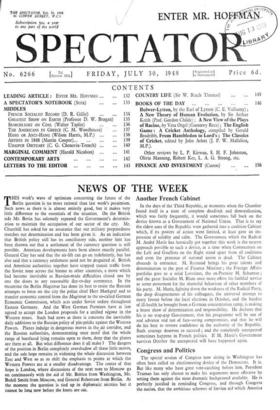NEWS OF THE WEEK T HIS week's wave of optimism concerning
the future of the Berlin question is no more rational than last week's pessimism. Such news as there is is almost entirely good, but it makes very little difference to the essentials of the situation. On the British side Mr. Bevin has solemnly repeated the Government's determin- ation to maintain the occupation of our sector of the city. Mr. Churchill has asked for an assurance that our military preparedness matches our determination and has been given it. As an indication that British policy still has its conciliatory side, another hint has been thrown out that a settlement of the currency question is still possible. American developments have been almost exactly parallel. General Clay has said that the air-lift can go on indefinitely, but has also said that a currency settlement need not be despaired of. British and American authorities together have stopped transit traffic from the Soviet zone across the bizone to other countries, a move which had become inevitable as Russian-made difficulties closed one by one the doors to any reasonable day-to-day commerce. In the meantime the Berlin Magistrat has done its best to resist the Russian attempts to force on the city the police chief Herr Markgraf and to transfer economic control from the Magistrat to the so-called German Economic Commission, which acts under Soviet orders throughout Eastern Germany. And the West German Premiers have at last agreed to accept the London proposals for a unified regime in the Western zones. Such bad news as there is concerns the inevitable daily additions to the Russian policy of pin-pricks against the Western Powers. Planes indulge in dangerous moves in the air corridor, and the Russian authorities, demonstrating once more that the whole range of barefaced lying remains open to them, deny that the planes are there at all. But what difference does it all make ? The dangers of the position in Berlin completely overshadow all these little moves, and the sole hope remains in widening the whole discussion between East and West so as to shift the emphasis to points at which the Western Powers are at a smaller disadvantage. The centre of that hope is London, where discussions of the next note to Moscow go on continuously with the aid of Mr. Bohlen from Washington, Mr. Bedell Smith from Moscow, and General Robertson from Berlin. At the moment the question is tied up in diplomatic niceties but it cannot be long now before the knots are cut.


































